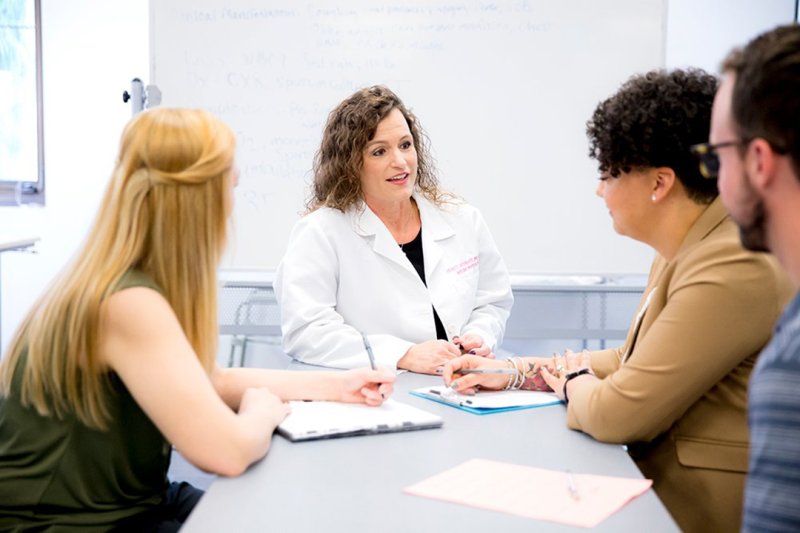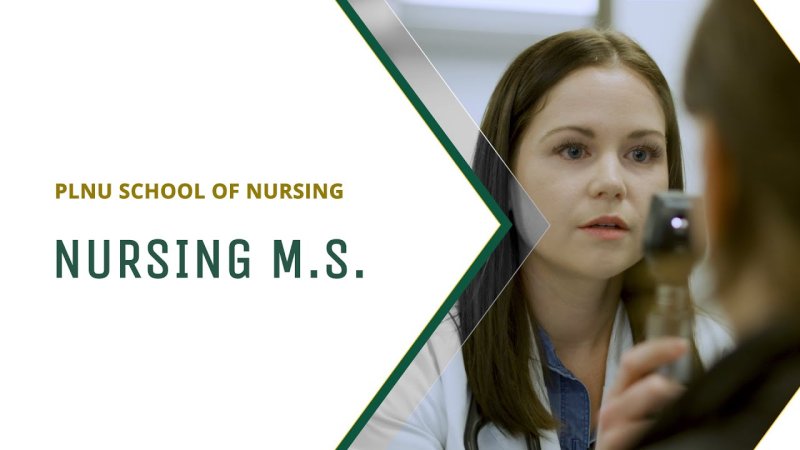
As the healthcare industry continues to expand and shift due to an aging U.S. population and increased technological innovation, it’s becoming increasingly more important for the largest percentage of workers within the industry — our nurses — to keep pace with these exponential changes.
One article estimates that 4 million new jobs will be created by 2026. That’s why nurses within all areas of practice, from women’s health to intensive care to public health are seriously considering going back to school to not only further their careers but to better serve the patients whose lives depend on them. While not every nurse may feel the need to pursue more education, there is no doubt that the demand for more educated nurses will only continue to grow.
Barb Taylor, Ph.D., RN, the dean of PLNU’s School of Nursing echoes this demand for nurses with higher levels of education in our country.
“Back in 2004, the American Association of Critical-Care Nurses (AACN) said that entry into one of the four nursing roles for advanced practice, which includes certified nurse midwife, certified registered nurse anesthetist, certified nurse practitioner, and clinical nurse specialist, was going to require a doctorate for entry into practice by the year 2015,” Taylor said.
__________
Who are you called to be?
Pursue your purpose at PLNU.
__________
While the 2015 mark may have initially been too aggressive, and that goal has been pushed to 2025, the takeaway remains: nurses who want to get into advanced practice will still require a master’s degree and a sizable amount of education. Additionally, even for those nurses who don’t want to continue into advanced practice but only have an associate’s degree (ADN), there is a push for more education in the healthcare industry at this level as well, with the goal of having 80 percent of all nurses with a BSN by 2020.
Nurses within all areas of practice, from women’s health to intensive care to public health, are seriously considering going back to school to not only further their careers, but to better serve the patients whose lives depend on them
Taylor acknowledged that this means nurses will have a lot of competition as the industry continues to demand more education from them.
“Nursing is changing a lot,” Taylor said. “The idea of a nurse being at the bedside for thirty years really doesn’t happen very much anymore. And from a national perspective, there’s research that shows the higher degree of your nursing staff in your hospital the decrease there is in negative outcomes.
Michelle Riingen, DNP, RN, CNS-BC, the associate dean and director of PLNU’s RN to BSN accelerated undergraduate program, agrees with this push for more education in nursing.
“With nurses being the largest population within the healthcare team, nurses need to maintain lifelong learning to better provide care in dynamic environments,” Riingen said.
In light of all this, if you’re a nurse with a BSN and are thinking about going to graduate school, it’s probably a good idea. Still, what if you don’t know exactly what type of program to enroll in based on your passions and skills? Outlined below are some of the potential options and their differences for those looking at the next steps in their nursing careers.
The 4 Advanced Practice Registered Nurse (APRN) Roles
When considering working toward an advanced practice role in nursing, it’s important to ask yourself certain questions. What is it about nursing that you’re passionate about? Do you like the idea of remaining on a hospital floor and being at the bedside? Do you want to assess, diagnose, and treat patients alongside a doctor or physician’s assistant? Are you motivated to help patients with issues related to women’s health? Your answers to these questions and many others will help dictate what type of program you should pursue. It’s also worth noting that you can only begin to pursue one of these four tracks if you already have a BSN. Nurses interested in these tracks without a BSN should look into RN to BSN or RN to MSN programs as an immediate next step.
What is it about nursing that you’re passionate about?
There are four types of roles for an Advanced Practice Registered Nurse (APRN): clinical nurse specialists, certified registered nurse anesthetists, certified nurse practitioners, and certified nurse midwives. All of these roles require a master’s or DNP degree in addition to appropriate certification and licensing. Different universities offer different types of graduate programs that prepare nurses for these four main tracks, and so it’s important to ensure the graduate program you’re considering fits with the advanced practice role you want to pursue.
For example, at the graduate level, PLNU offers a master’s of science in nursing (MSN) with a certification track, Doctor of Nursing Practice, Family Nurse Practitioner, and Doctor of Nursing Practice, Clinical Nurse Specialist to prepare nurses to assume the role of a clinical nurse specialist. Additionally, for nurses who already have an MSN, PLNU offers a Post-Graduate CNS Certificate and a Post-Graduate FNP Certificate to prepare nurses for clinical nurse specialist or family nurse practitioner roles as well. Further, at least some experience within your nursing field of interest is usually required in order to be accepted into a graduate program that prepares nurses for one of the four APRN roles. This means that if you wanted to acquire an MSN along with the CNS certification and work in, say, the adult-gerontology area, you would need to have some basic experience working within the adult-gerontology setting before applying.
Certified Nurse Practitioner (CNP)
Certified nurse practitioners work alongside a supervising physician in order to assist and treat patients. They can prescribe medication, examine patients, and diagnose certain illnesses, giving them responsibilities that are similar to that of doctors, though their exact responsibilities will depend on the state where they’re administering care. There are several areas of expertise that you can work within as a certified nurse practitioner, such as acute care, family practice, gerontology, neonatal, pediatric, psychiatric/mental health, and women’s health.
“A nurse practitioner is going to focus on providing primary care. They will work on par with a physician’s assistant (PA). The PA will have an education focused on a medical approach and the NP will have an advanced education in nursing,” Taylor said. “The NP will have the consultative supervision of an MD to administer healthcare and assess, diagnose, and treat patients. From a healthcare perspective in the United States, nurse practitioners are an excellent addition to meeting the needs of the healthcare of the nation.”
From a healthcare perspective in the United States, nurse practitioners are an excellent addition to meeting the needs of the healthcare of the nation.
As a nurse, if you find yourself drawn to work that is similar to that of a primary care physician — meeting with patients whom you might become familiar with over time to assess, diagnose, and treat a host of symptoms related to health and wellness, managing chronic conditions, and working toward disease prevention — then this might be the right track for you.
Prerequisites for Role: Relevant nursing experience, master’s degree and specialized graduate preparation, and state licensing and certification
Average Salary: $108,835 (salary varies based on experience, area of specialty, state of practice, etc.)
Clinical Nurse Specialist (CNS)
A clinical nurse specialist works within a hospital or other clinical setting and applies evidence-based practices to assist patients, nurses, and the healthcare organization overall. They are often in leadership, administrative, or educational roles within clinical settings. In addition to having an area of specialty, they are trained in physiology, pharmacology, and physical assessment.
“A clinical nurse specialist involves applying research and providing clinical expertise as well as having communication and leadership abilities,” Taylor said. Taylor pointed to a CNS working on a stroke unit to provide an example. “A CNS working on a stroke unit would manage the stroke patient from an inpatient perspective, working to facilitate stroke victims’ transition to home and providing continuous resources for the patient [and their family] after they leave the hospital.”
Taylor also gave the example of a CNS working with patients of congestive heart failure. In this case, once the patient has been allowed to return home, the CNS would continue to speak with the patient over the phone, monitoring symptoms by asking questions and addressing issues that might come up in order to keep the patient trending toward recovery.
But this is only one of the many areas where a CNS might work, as they can be found in one of the three main healthcare spheres: the patient, nurse, or organization sphere. So, a CNS working for the organization in, say, acute care, could be involved with helping the hospital develop better practices for treating patients in that unit on an organizational level. For a CNS working with the nurses, they might be in charge of teaching, training, and managing them to be more proficient healthcare practitioners. And another CNS might be working specifically with the patients, similar to what Taylor mentioned above with patients suffering from a stroke or congestive heart failure.
If you find that you like to be involved with several activities while remaining within the clinical setting, be that as not only an educator or a leader but also as someone who continues to work with the patients, then a clinical nurse specialist might be the right track for you.
Prerequisites for Role: Relevant nursing experience, master’s degree and specialized graduate preparation, and state licensing and certification
Average Salary: $106,411 (salary varies based on experience, area of specialty, state of practice, etc.)
Certified Registered Nurse Anesthetist (CRNA)
A certified registered nurse anesthetist helps administer anesthesia in different medical settings. They work with surgeons, anesthesiologists, dentists, and other healthcare professionals to ensure patients throughout the process of surgery are taken care of, which includes managing patients’ pain, making sure patients are stabilized, and tending to patients’ postoperative recovery.
Becoming a certified nurse anesthetist requires advanced training due to the expertise needed to help administer serious surgeries and other medical procedures. If you feel drawn to the surgical side of medicine and to helping patients in recovery, then the certified registered nurse anesthetists might be the right track for you.
Prerequisites for Role: Relevant nursing experience, master’s degree and specialized graduate preparation, and state licensing and certification
Average Salary: $185,126 (salary varies based on experience, area of specialty, state of practice, etc.)
Certified Nurse Midwife (CNM)
Similar to the certified registered nurse anesthetists, certified nurse midwives entail a more specific set of roles and responsibilities, which relate to treating women with childbirth and reproductive health. They help with childbirths, provide counseling to women, write prescriptions, and assist patients throughout the pregnancy process. They can be found in hospitals, private practices, and other types of clinics.
Do you feel drawn to women’s health and childbirth? If you feel that offering nursing healthcare in these capacities inspires you then this might be the right track for you.
Prerequisites for Role: Relevant nursing experience, master’s degree and specialized graduate preparation, and state licensing and certification
Average Salary: $109,841 (salary varies based on experience, area of specialty, state of practice, etc.)
Should I Get a Graduate Degree in Nursing?
Healthcare continues to expand and nurses make up a major part of this industry. Do you want to advance your career in nursing? If so, PLNU offers a master's or DNP degree with clinical nurse specialist or family nurse practitioner track. PLNU’s School of Nursing supports students through every step of the journey. We would love to help you determine your next steps.
